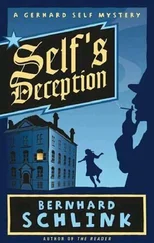She must have seen how I was feeling. “Come with me, I’ll show you Frau Schmitz’s cell.” She went ahead, but kept turning around to tell me things or explain them to me. Here is where there had been a terrorist attack, here was the sewing shop where Hanna had worked, this is where Hanna once held a sit-down strike until cuts in library funding were reinstated, this was the way to the library. She stopped in front of the cell. “Frau Schmitz didn’t pack. You’ll see her cell the way she lived in it.”
Bed, closet, table, chair, a shelf on the wall over the table, a sink and toilet in the corner behind the door. Glass bricks instead of window glass. The table was bare. The shelf held books, an alarm clock, a stuffed bear, two mugs, instant coffee, tea tins, the cassette machine, and on two lower shelves, the cassettes I had made.
“They aren’t all here.”
The warden had followed my glance. “Frau Schmitz always lent some tapes to the aid society for blind prisoners.”
I went over to the bookshelf. Primo Levi, Elie Wiesel, Tadeusz Borowski, Jean Améry-the literature of the victims, next to the autobiography of Rudolf Hess, Hannah Arendt’s report on Eichmann in Jerusalem, and scholarly literature on the camps.
“Did Hanna read these?”
“Well, at least she ordered them with care. Several years ago I had to get her a general concentrationcamp bibliography, and then one or two years ago she asked me to suggest some books on women in the camps, both prisoners and guards; I wrote to the Institute for Contemporary History, and they sent a specialized bibliography. As soon as Frau Schmitz learned to read, she began to read about the concentration camps.”
Above the bed hung many small pictures and slips of paper. I knelt on the bed and read. There were quotations, poems, little articles, even recipes that Hanna had written down or cut out like pictures from newspapers and magazines. “Spring lets its blue banner flutter through the air again,” “Cloud shadows fly across the fields”-the poems were all full of delight in nature, and yearning for it, and the pictures showed woods bright with spring, meadows spangled with flowers, autumn foliage and single trees, a pasture by a stream, a cherry tree with ripe red cherries, an autumnal chestnut flamed in yellow and orange. A newspaper photograph showed an older man and a younger man, both in dark suits, shaking hands. In the young one, bowing to the older one, I recognized myself. I was graduating from school, and was getting a prize from the principal at the ceremony. That was a long time after Hanna had left the city. Had Hanna, who could not read, subscribed to the local paper in which my photo appeared? In any case she must have gone to some trouble to find out about the photo and get a copy. And had she had it with her during the trial? I felt the tears again in my chest and throat.
“She learned to read with you. She borrowed the books you read on tape out of the library, and followed what she heard, word by word and sentence by sentence. The tape machine couldn’t handle all that constant switching on and off, and rewinding and fast-forwarding. It kept breaking down and having to be repaired, and because that required permission, I finally found out what Frau Schmitz was doing. She didn’t want to tell me at first; when she also began to write, and asked me for a writing manual, she didn’t try to hide it any longer. She was also just proud that she had succeeded, and wanted to share her happiness.”
As she spoke, I had continued to kneel, my eyes on the pictures and notes, fighting back tears. When I turned around and sat down on the bed, she said, “She so hoped you would write. You were the only one she got mail from, and when the mail was distributed and she said ‘No letter for me?’ she wasn’t talking about the packages the tapes came in. Why did you never write?”
I still said nothing. I could not have spoken; all I could have done was to stammer and weep.
She went to the shelf, picked up a tea tin, sat down next to me, and took a folded sheet of paper from her suit pocket. “She left a letter for me, a sort of will. I’ll read the part that concerns you.” She unfolded the sheet of paper. “There is still money in the lavender tea tin. Give it to Michael Berg; he should send it, along with the 7,000 marks in the bank, to the daughter who survived the fire in the church with her mother. She should decide what to do with it. And tell him I say hello to him.”
So she had not left any message for me. Did she intend to hurt me? Or punish me? Or was her soul so tired that she could only do and write what was absolutely necessary? “What was she like all those years?” I waited until I could go on. “And how was she these last few days?”
“For years and years she lived here the way you would live in a convent. As if she had moved here of her own accord and voluntarily subjected herself to our system, as if the rather monotonous work was a sort of meditation. She was greatly respected by the other women, to whom she was friendly but reserved. More than that, she had authority, she was asked for her advice when there were problems, and if she intervened in an argument, her decision was accepted. Then a few years ago she gave up. She had always taken care of herself personally, she was slender despite her strong build, and meticulously clean. But now she began to eat a lot and seldom washed; she got fat and smelled. She didn’t seem unhappy or dissatisfied. In fact it was as though the retreat to the convent was no longer enough, as though life in the convent was still too sociable and talkative, and she had to retreat even further, into a lonely cell safe from all eyes, where looks, clothing, and smell meant nothing. No, it would be wrong to say that she had given up. She redefined her place in a way that was right for her, but no longer impressed the other women.”
“And the last days?”
“She was the way she always was.”
“Can I see her?”
She nodded, but remained seated. “Can the world become so unbearable to someone after years of loneliness? Is it better to kill yourself than to return to the world from the convent, from the hermitage?” She turned to me. “Frau Schmitz didn’t write anything about why she was going to kill herself. And you won’t say what there was between you that might have led to Frau Schmitz’s killing herself at the end of the night before you were due to pick her up.” She folded the piece of paper, put it away, stood up, and smoothed her skirt. “Her death is a blow to me, you see, and at the moment I’m very angry, at Frau Schmitz, and at you. But let’s go.”
She led the way again, this time silently. Hanna lay in the infirmary in a small cubicle. We could just fit between the wall and the stretcher. The warden pulled back the sheet.
A cloth had been tied around Hanna’s head to hold up her chin until the onset of rigor mortis. Her face was neither particularly peaceful nor particularly agonized. It looked rigid and dead. As I looked and looked, the living face became visible in the dead, the young in the old. This is what must happen to old married couples, I thought: the young man is preserved in the old one for her, the beauty and grace of the young woman stay fresh in the old one for him. Why had I not seen this reflection a week ago?
I must not cry. After a time, when the warden looked at me questioningly, I nodded, and she spread the sheet over Hanna’s face again.
I T WAS AUTUMN before I could carry out Hanna’s instructions. The daughter lived in New York, and I used a meeting in Boston as the occasion to bring her the money: a bank check plus the tea tin with the cash. I had written to her, introduced myself as a legal historian, and mentioned the trial. I told her I would be grateful for a chance to talk to her. She invited me to tea.
Читать дальше












